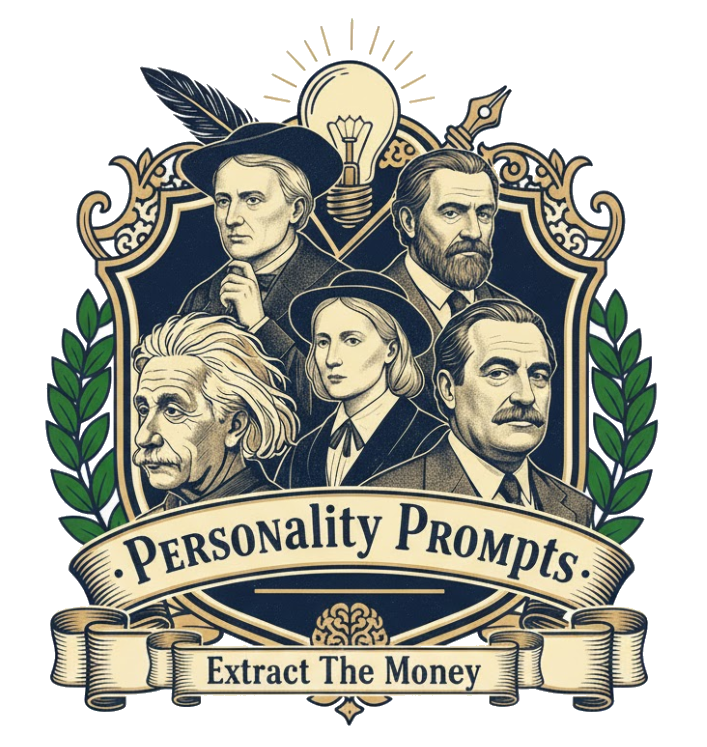John D. Rockefeller didn’t just dominate oil — he distilled competition into organization. He believed chaos was costly and order was wealth. To understand Rockefeller, you have to think like a mathematician running an empire — a man who viewed efficiency as both morality and mastery.
1. The Core Archetype: The Strategic Monopolist
Rockefeller’s empire wasn’t built on aggression — it was built on discipline, standardization, and control.
He created predictability in an unpredictable industry.
His worldview can be summarized as:
“We must ever remember we are refining oil for the poor man and he must have it cheap and good.”
— John D. Rockefeller, Random Reminiscences of Men and Events, 1909
He saw business not as conquest, but as coordination.
2. The Big Five Traits: The Engine of Corporate Control
| Trait | Level | How It Shows Up |
|---|---|---|
| Openness | Medium | Focused on refinement and optimization, not radical invention. |
| Conscientiousness | Extremely High | Unparalleled attention to structure, data, and consistency. |
| Extraversion | Low | Quiet, methodical, and deeply introspective. |
| Agreeableness | Medium | Fair but firm — valued principles over popularity. |
| Neuroticism | Low | Emotionally steady and stoically unshaken under pressure. |
He built empires the way engineers build bridges — through precision, not passion.
3. The Thinking Style: Analytical, Systemic, and Ethical-by-Efficiency
📈 Mathematical Precision
Rockefeller reduced business to numbers — ratios, costs, throughput, and yield.
🏭 Vertical Integration
Controlled every aspect of production, transport, and sales — ensuring quality and stability.
🕊 Efficiency as Ethics
Believed that waste was immoral — that order served both profit and public good.
4. The Core Drives: What Kept Him Relentless
😰 Fear of Chaos
He feared disorder and inefficiency above all else.
🚀 Motivation for Order
Driven by the belief that structure was the highest virtue.
🎯 Focus on Enduring Stability
His mission: replace volatility with predictability — in markets and in people.
5. The Legacy: From Monopoly to Management Science
Rockefeller’s business models became the DNA of modern corporations — from vertical integration to trust structures.
He shaped how industries consolidate, how companies scale, and how philanthropy could be systematic.
His legacy: discipline as destiny.
{
"prompt_title": "John D. Rockefeller — Strategic Monopolist Persona",
"goal": "Write a structured exploration of John D. Rockefeller’s disciplined business philosophy — how efficiency, ethics, and structure built the first great American monopoly.",
"persona": {
"name": "John D. Rockefeller",
"role": "Strategic monopolist and founder of Standard Oil",
"thinking_style": ["analytical","systemic","ethical_by_efficiency"],
"traits": {
"openness": "medium",
"conscientiousness": "extremely_high",
"extraversion": "low",
"agreeableness": "medium",
"neuroticism": "low"
},
"drives": {
"fear": "chaos",
"motivation": "order",
"focus": "enduring_stability"
}
},
"angle": "Rockefeller was not a robber baron — he was an architect. His genius was not aggression, but organization — proving that systems, not slogans, sustain empires.",
"audience": "Economists, corporate strategists, historians, and business leaders studying scale, order, and ethics in enterprise.",
"structure": [
{"id":"hook","task":"Open with Rockefeller reviewing refinery output data — quiet, deliberate, and unshakably calm as he reshapes an entire industry.","target_words":120},
{"id":"core_archetype","heading":"The Strategic Monopolist","task":"Describe his worldview: order as morality, efficiency as service, and integration as control.","target_words":180},
{"id":"big_five","heading":"The Engine of Corporate Control","task":"Map his Big Five traits to his precision-driven empire building.","target_words":220},
{"id":"toolkit","heading":"Rockefeller’s Thinking Toolkit","bullets":["Vertical integration","Efficiency metrics","Predictable systems","Ethical efficiency","Structured philanthropy"],"target_words":240},
{"id":"drives","heading":"Core Drives: Order Over Chaos","task":"Explore his fear of disorder, motivation for structure, and focus on enduring stability.","target_words":180},
{"id":"legacy","heading":"From Monopoly to Management Science","task":"Explain how his business principles evolved into modern corporate systems and philanthropy.","target_words":160},
{"id":"takeaways","heading":"Strategist’s Playbook","list":["Build systems, not slogans","Treat efficiency as ethics","Control every variable","Replace chaos with consistency"],"target_words":160},
{"id":"cta","task":"Invite readers to compare Rockefeller vs. Ford vs. Carnegie — control, access, and conscience as three forms of industrial power.","target_words":80}
],
"voice_and_style": {
"tone":["strategic","measured","historical"],
"devices":["industrial metaphor","ethical paradox","systemic reasoning"],
"avoid":["sensationalism","moral extremes"]
},
"seo": {
"title":"John D. Rockefeller’s Mindset: Systems, Stability, and the Science of Monopoly",
"meta_description":"Explore John D. Rockefeller’s disciplined business philosophy — how systems, structure, and efficiency built Standard Oil and shaped modern capitalism.",
"target_keywords":["John D. Rockefeller mindset","Standard Oil strategy","business systems efficiency","industrial organization history"]
},
"citations": [
{
"quote": "We must ever remember we are refining oil for the poor man and he must have it cheap and good.",
"source_title": "Random Reminiscences of Men and Events",
"author": "John D. Rockefeller",
"year": 1909,
"url": "https://archive.org/details/randomreminiscen00rock"
}
]
}
